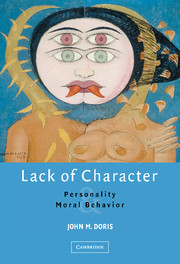Book contents
- Frontmatter
- Contents
- Preface: A Renaissance of Virtue
- Lack of Character
- 1 Joining the Hunt
- 2 Character and Consistency
- 3 Moral Character, Moral Behavior
- 4 The Fragmentation of Character
- 5 Judging Character
- 6 From Psychology to Ethics
- 7 Situation and Responsibility
- 8 Is There Anything to Be Ashamed Of?
- Notes
- References
- Acknowledgments
- Author Index
- Subject Index
7 - Situation and Responsibility
Published online by Cambridge University Press: 05 July 2014
- Frontmatter
- Contents
- Preface: A Renaissance of Virtue
- Lack of Character
- 1 Joining the Hunt
- 2 Character and Consistency
- 3 Moral Character, Moral Behavior
- 4 The Fragmentation of Character
- 5 Judging Character
- 6 From Psychology to Ethics
- 7 Situation and Responsibility
- 8 Is There Anything to Be Ashamed Of?
- Notes
- References
- Acknowledgments
- Author Index
- Subject Index
Summary
There are crowds of things which operate within ourselves without our will.
Pierre JanetResponsibility and Reactive Attitudes
Human beings, unlike rocks, raccoons, and rainstorms, are sometimes subjects of moral responsibility. But which human beings are responsible for their actions, and when? These are notoriously incorrigible questions, and I won't say much here to make them easier. Indeed, I raise them because my arguments exacerbate the difficulty: I advocate eschewing central forms of character assessment, while responsibility attribution seems to presuppose such assessments.
According to Hume, a person is responsible only for actions that proceed from her “characters and disposition”; to attribute responsibility is to attribute behavior to an enduring feature of character. People apparently have a more intimate relation to behaviors that are an “expression of their character” than to behaviors that are not such expressions; my impassioned political activism says rather more about me than does my paying the electric bill, and it seems perfectly natural that I get credit (or blame) for the one and not the other. If such intuitions lead to a view like Hume's, situationism undermines responsibility attribution.
There is at the start a straightforward way to evade this problem: The situationist can endorse a consequentialist “social-regulation” approach to responsibility (see Watson 1993: 121). For the consequentialist, holding people responsible is justified by its results: If blaming you effects better behavior, I am justified in doing so, whatever sort of person you are (see Smart 1961).
- Type
- Chapter
- Information
- Lack of CharacterPersonality and Moral Behavior, pp. 128 - 153Publisher: Cambridge University PressPrint publication year: 2002
- 1
- Cited by



